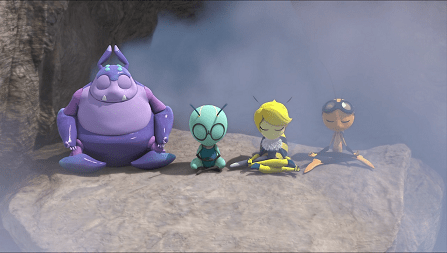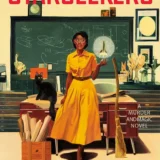
Back in issue #277, I reviewed Drew Wagar’s Shadeward Saga. That series took place in the far future on a tidally locked world that orbited a red dwarf star, its inhabitants the descendants of a colony that had reverted to a feudal state that felt in many ways like a fantasy setting (think Anne McCafferty’s Dragonriders of Pern).
The Shadeward Saga ended with some tantalizing hints as to what happened not just to their colony, but the rest of humanity.
Enter the Hegira Saga, and the first book in the series, Contravention. Here we get to see what was going on in the rest of the galaxy around the time Shadeward took place. But if you haven’t read Shadeward yet, don’t worry, because that world has been isolated from the rest of humanity. So while they happen at the same point in time, their stories do not overlap.
What’s more intriguing is the fact that this isolation isn’t by choice.
It’s a mystery, one of many we’re introduced to. We start with a meeting between two people steeped in so much secrecy we don’t know their names, faces, or even what planet they’re on. Through them, we learn that all of humanity has been confined to a region of space thirty light-years across. Something is keeping them confined to this bubble. It’s not common knowledge yet, but it’s only a matter of time before it is.
This secret meeting between shadowy figures harkens back to another of Drew’s series, the two books he wrote for the game Elite: Dangerous—Reclamation and Premonition.
Fans of that setting will see some similarities in the world building here. There are three major governments, with the elegant but elitist Hegemony and the bluntly capitalist Coalition being the most powerful. The third, the Far Alliance, broke off from the Hegemony and secured its independence fifty years ago, but they are the underdog of the bunch.
The clandestine meeting at the start sets the wheels in motion, but is not the focus of the story. Contravention follows three sets of characters whose fates eventually entwine as their paths converge.
First there is the crew of a small trading vessel who are about to have a very bad day. The captain, Callan, is barely making enough res (the currency of this universe) to get by, but their cargo is especially important to Cass, their engineer, who has debts to pay to all the wrong people. Their pilot, Ash, who looks way too big to be a pilot, tends to be pragmatic to the point of callousness. And Elspeth is an old, grumpy lady who is useful in negotiations and even more useful in a fight.
They are space truckers, if you will, whose main goal in life is to make enough res to keep flying and pay the bills.
But, as I said, they’re about to have a very bad day.
The next group we focus on centres on a young up-and-coming Navigator named Theo.
Navigators are an essential part of this universe because of how FTL travel works. While in-system space flight is depicted as realistically as possible (fans of The Expanse will approve) FTL is always in the realm of space magic (at worse) or vague theory (at best). In the Hegira universe, they use Mesh-gates situated far beyond any gravitation influences, which means it takes days or even weeks to get to and from these gates via normal Newtonian physics.
Travel through the mesh is virtually instant, but can’t be handled reliably by a computer. A human mind is required to deal with the strange random factors computers can’t cope with. That makes human Navigators essential, which means they’re very well paid, which means, well, they tend to be a snooty bunch. And Theo is no exception.
Theo is from the Far Alliance which, despite being the smallest of the three powers, does have a technological edge over the other two. The Hegemony they seceded from abhors things like genetic or cybernetic enhancements, while the Coalition lags behind on that front due to their focus on profit.
Theo ends up being diverted from his final Navigator assessment to shuttle a rather bombastic and forceful history professor named Vilias and his quiet and not-quite-right assistant Zia on what is supposed to be a simple trip to the Teegarden system, a system that only recently got a Mesh-gate operational.
Of course, the moment I said “simple trip” you knew it was going to be anything but.
Finally, we have a window to the political side of things. A peace conference between the Hegemony and Coalition is about to start, and everyone has an agenda.
On the Hegemony side, we have the Duchess Mélisande de Lavigne, who is the guardian to Lady Sheba, next in line to succeed the ailing Empress, though only a few know this fact. Mélisande is the calculating sort with plans within plans, and her plans for Sheba leave her young ward secretly pining for escape.
On the Coalition side, there is Verre. A man who is still a soldier at heart, despite the diplomatic position he now finds himself in. He’s the observant type, more about seeing through schemes than instigating them.
But as we know from the start of the novel, this peace conference is not going to end well.
The stage is set for intrigue, adventure, and mystery. Drew has a lot of balls to juggle, but does so admirably. There’s enough familiar here for fans of Firefly or The Expanse to get hooked with, while also having plenty of fresh and original ideas to play with—such as the mysterious reason humanity is confined to a bubble of space 30 light years wide.
By the end, these story threads come together and set up the next three books. You could call this an origin story, and it is one that has me invested in the rest of the series when it’s released.
In any kind of space opera, there’s a balance needed between making its setting both familiar and original. Too much of either can drive readers off.
That begs the question of what an author has to offer the reader that all the others in the genre cannot. Anyone can throw in space battles or small ship crews trying to get by, or conspiracies and mysteries that will alter the universe as they know it.
In the end, it all comes down to character. It doesn’t matter how familiar or unique a setting is, so long as we care about the characters first and foremost, even if they’re only on the page for a little while.
Drew does that well. Here we get to see where everyone is starting off, who they are now and what they’re like. By the end, we are left wondering where each of them will end up, because we know they won’t be the same people as when they started.
That’s the sign of a good story.
Source: Noah Chinn Reviews: Contravention by Drew Wagar










Recent Comments